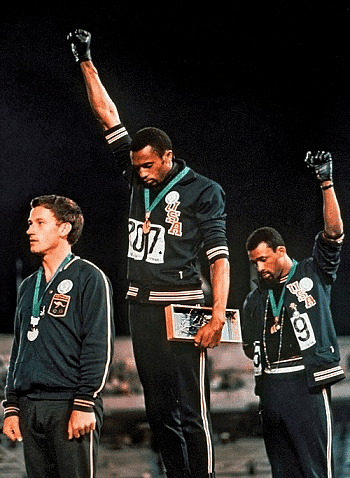Class 10 Exam > Class 10 Notes > Chapter Notes: Democracy & Diversity
Class 10 Civics Notes - Democracy and Diversity
A Story from Mexico Olympics

- Racial discrimination in the United States
- Civil Rights Movement
- Olympics in Mexico 1968- Protest by US Athletes, winner of gold and bronze medals, to draw international attention to racial discrimination in the United States
- An Australian silver medalist Peter Norman to support the two Americans
- Action by International Olympic Association.
Question for Chapter Notes: Democracy & DiversityTry yourself:What does the “Civil Rights Movement of USA” signify?
View Solution
Differences, Similarities, Divisions
- Origins of social differences
- Causes
(a) Birth
(b) Choice - atheists or following any religion, study, occupation
(c) Different social groups - differences and similarities within it - Overlapping and cross-cutting differences
(a) Northern Ireland - Catholic to be poor
(b) Netherlands - Catholic and Protestants equally to be poor and rich
(c) Overlapping and social divisions but crosscutting and accommodation.
Politics of Social Divisions
- Political parties’ competition can make social divisions into political divisions and lead to conflicts, violence, even disintegration.
- Range of outcomes
(a) Northern Ireland - years of violent and bitter-ethnopolitical conflict
(b) 1998 and peace
(c) Yugoslavia and disintegration - To avoid a mixture of social divisions and politics
- But not so in every case
- Social divisions reflect in politics - promises, effect on voting, preference for one party or other and no disintegration.
Three Determinants
Three factors:
- How people perceive their identities, examples of Ireland and Belgium
- How political leaders raise their demand of any community: Examples of Sri Lanka and Yugoslavia
- Government’s reaction to demands: Example of Belgium accommodation and unity
In democracy expression of social divisions - normal and healthy.
FAQs on Class 10 Civics Notes - Democracy and Diversity
| 1. What were the main differences observed during the Mexico Olympics? |  |
Ans. The main differences observed during the Mexico Olympics were the political and social divisions among the participating countries. The Olympics took place during a period of intense political unrest, with countries divided along ideological lines such as the Cold War. Additionally, there were differences in terms of economic development and resources among the participating nations.
| 2. What were the similarities among the participating countries during the Mexico Olympics? |  |
Ans. Despite the differences, there were also several similarities among the participating countries during the Mexico Olympics. One major similarity was the common goal of athletic excellence and competition. Athletes from different nations came together to compete in various sports, showcasing their skills and representing their countries on a global stage. Additionally, the Olympics fostered a sense of camaraderie and unity among the athletes, regardless of their backgrounds.
| 3. How did the politics of social divisions impact the Mexico Olympics? |  |
Ans. The politics of social divisions had a significant impact on the Mexico Olympics. The political tensions and divisions among the participating countries spilled over into the Games. For example, there were instances of political protests and demonstrations by athletes, particularly from African-American athletes in the United States, highlighting racial discrimination and inequality. These events showcased how the Olympics became a platform for political expression and brought attention to social issues.
| 4. How did the Mexico Olympics reflect the democracy and diversity of the participating countries? |  |
Ans. The Mexico Olympics reflected the democracy and diversity of the participating countries through the inclusion of athletes from various backgrounds and nations. The Games provided an opportunity for countries to showcase their cultural diversity and promote the ideals of democracy and equality. Additionally, the Mexico Olympics marked the first time that the Games were held in a developing country, highlighting the importance of inclusivity and representation.
| 5. What were the main social divisions observed during the Mexico Olympics? |  |
Ans. The main social divisions observed during the Mexico Olympics were based on factors such as race, class, and gender. Racial divisions were particularly prominent, with the Black Power salute by African-American athletes during the medal ceremony becoming an iconic symbol of the civil rights movement. There were also divisions based on class, with athletes from wealthier nations having access to better training facilities and resources. Additionally, gender divisions were evident, with unequal representation and opportunities for female athletes compared to their male counterparts.
Download as PDF

|
Explore Courses for Class 10 exam
|

|
Signup for Free!
Signup to see your scores go up within 7 days! Learn & Practice with 1000+ FREE Notes, Videos & Tests.
Related Searches


















